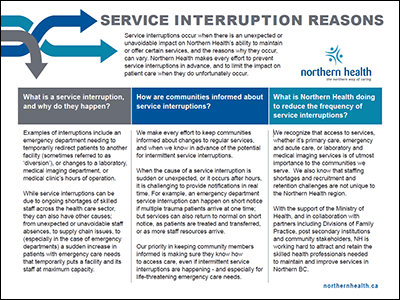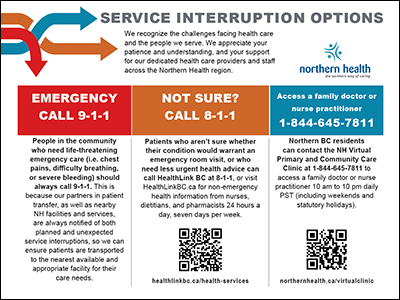Service interruptions are unexpected or unavoidable changes in Northern Health’s ability to maintain or offer certain services (e.g. emergency department, lab, or diagnostic imaging). They can occur from time to time and the reasons why they occur can vary. In some cases, service interruptions require that patients be sent to other facilities for emergency needs, or that we close certain departments for a temporary period.
Service interruptions are temporary and necessary for patient safety. We appreciate your patience as we work to provide you with care you need, when you need it!


Frequently asked questions (FAQ's)
Examples of service interruptions include an emergency department needing to temporarily redirect patients to another facility (sometimes referred to as ‘diversion’), or changes to a laboratory, medical imaging department, or medical clinic’s hours of operation.
While service interruptions can be due to ongoing shortages of skilled staff across the health sector, they can also have other causes; from power outages to unexpected or unavoidable staff absences, to supply chain issues, to (especially in the case of emergency departments) a sudden increase in patients with emergency care needs that temporarily puts a facility and its staff at maximum capacity.
If you’re having an emergency, ALWAYS call 9-1-1 (or your local emergency services number)
People in the community who need life-threatening emergency care (i.e. chest pains, difficulty breathing, or severe bleeding) should always call 9-1-1. This is because our partners in patient transfer, as well as nearby Northern Health facilities and services, are always notified of both planned and unexpected service interruptions, so we can ensure patients are transported to the nearest available and appropriate facility for their care needs.
Northern BC residents without a family doctor or who need care after hours can contact the NH Virtual Primary and Community Care Clinic at 1-844-645-7811 to access a family doctor or nurse practitioner. The Virtual Clinic is available 7 days a week from 10am – 10pm PST (including weekends and statutory holidays).
Patients who aren’t sure if their condition would warrant an emergency room visit, or who need less urgent health advice can also call HealthLink BC at 8-1-1 to speak to a nurse, dietitian, or pharmacist. This service is available 24 hrs a day, seven days per week.
We make every effort to keep communities informed about changes to regular services, and when we know in advance of the potential for intermittent service interruptions. For regular appointment-based service interruptions, patients will be contacted directly and rescheduled. For emergency service interruptions, signs will be posted at the site and our partners with BC Emergency Health Services will be notified. When the cause of a service interruption is sudden or unexpected, or it occurs after hours, it is challenging to provide notifications in real time.
For example, an emergency department service disruption can happen on short notice if multiple trauma patients arrive at one time; but services can also return to normal on short notice, as patients are treated and transferred, or as more staff resources arrive. Our priority in keeping community members informed is making sure they know how to access care, even if intermittent service disruptions are happening - and especially for life-threatening emergency care needs.
We recognize that access to services, whether it’s primary care, emergency and acute care, or laboratory and medical imaging services is of utmost importance to the communities we serve. We also know that staffing shortages and recruitment and retention challenges are not unique to the Northern Health region.
With the support of the Ministry of Health, and in collaboration with partners including Divisions of Family Practice, post-secondary institutions, and community stakeholders, NH is working hard to attract and retain the skilled health professionals needed to maintain and improve services in Northern BC.
Health Human Resources (HHR) strategy
Northern Health and the Ministry of Health work in partnership to identify the ongoing and growing health care needs of Northern communities, and invest in improving staff recruitment and retention under BC’s Health Human Resources (HHR) strategy. Our goal is that this work will help us add and retain the staff we need to ensure high-quality patient care.
Some highlights of the work being done to help stabilize services across the region include:
- Expansion of BC’s comprehensive health care worker rural retention program to include more Northern BC communities.
- This $6.38 million announcement by the Ministry of Health in September included funding for a prototype rural retention incentive, and includes communities in Hudson’s Hope, Tumbler Ridge, Chetwynd, Dawson Creek, Fort Nelson, Fort St. John, Hazelton, Prince Rupert, and (following a recent expansion) Haida Gwaii.
- Offering financial incentives and supports like travel, housing and childcare for priority health care workers for targeted Northern communities and occupations.
- Ongoing recruitment of and incentives for nursing staff.
- The GoHealth BC travel nursing program, which is a creative, innovative, and flexible approach to serving rural and remote communities.
We look forward to providing regular updates on what we’re doing to recruit and retain staff in the Northern BC region. More information about the Province of BC’s Health Human Resource (HHR) strategy can be found here: https://strongerbc.gov.bc.ca/health-care/
During service interruptions, there are steps you can take to help avoid unnecessary trips to the hospital:
- Patients who aren’t sure whether their condition would warrant an emergency room visit, or who need health advice can call HealthLink BC (8-1-1), or visit HealthLinkBC.ca for non-emergency health information from nurses, dietitians, and pharmacists 24/7. For deaf and hearing-impaired assistance (TTY), call 7-1-1.
- When’s the right time to visit the emergency department? Northern Health’s emergency rooms tend to patients who have experienced a sudden and/or unusual change in their health. This includes, but isn’t limited to, breathing difficulties, severe bleeding or pain, broken bones, chest pain, suspected overdoses, and eye injuries.
- For non-urgent care, use community health services including making an appointment with your family practitioner.
- Patients can also call the NH Virtual Clinic at 1-844-645-7811 to access a family doctor or nurse practitioner.
- BC residents can book appointments to see a pharmacist for 21 minor ailments and prescription contraceptives.
- If you are concerned about a possible poisoning or exposure to a toxic substance, call Poison Control at 1-800-567-8911.
If at any time you believe you require urgent medical attention, do not hesitate to call 9-1-1 for transportation to the nearest hospital accepting patients.
